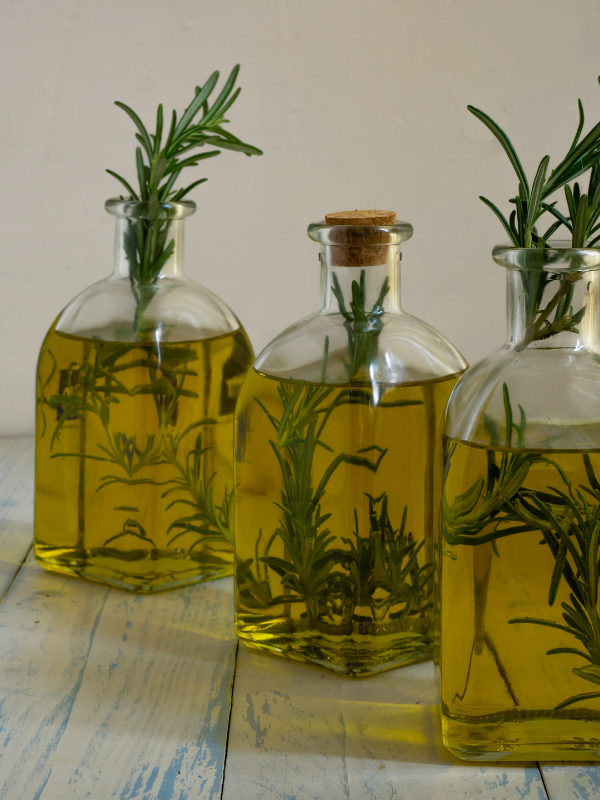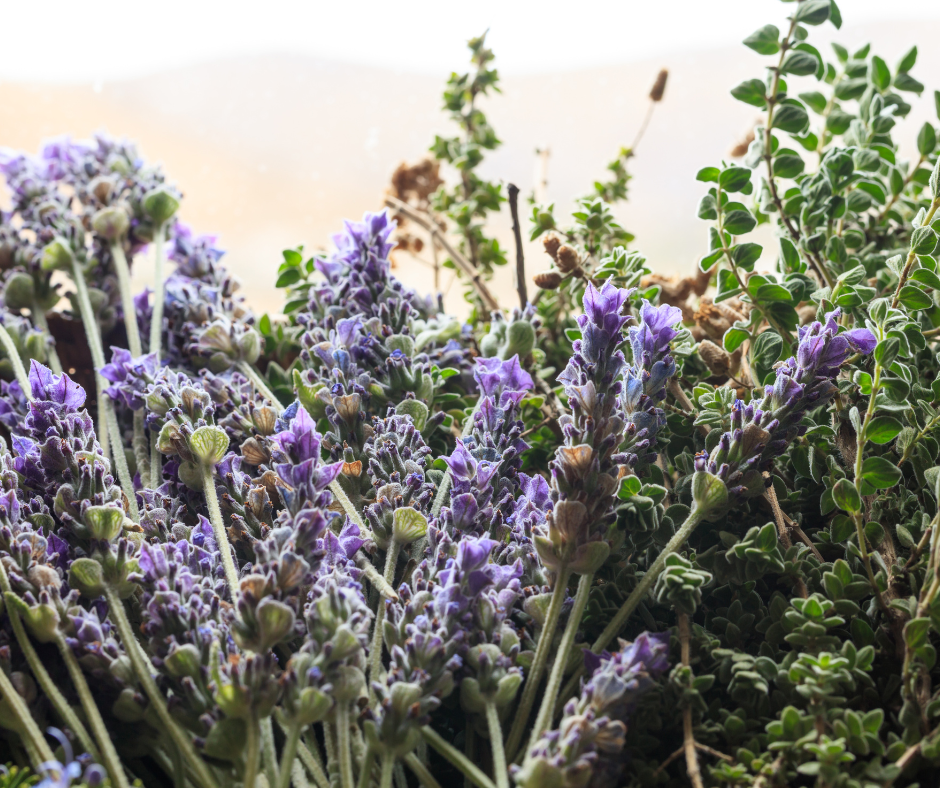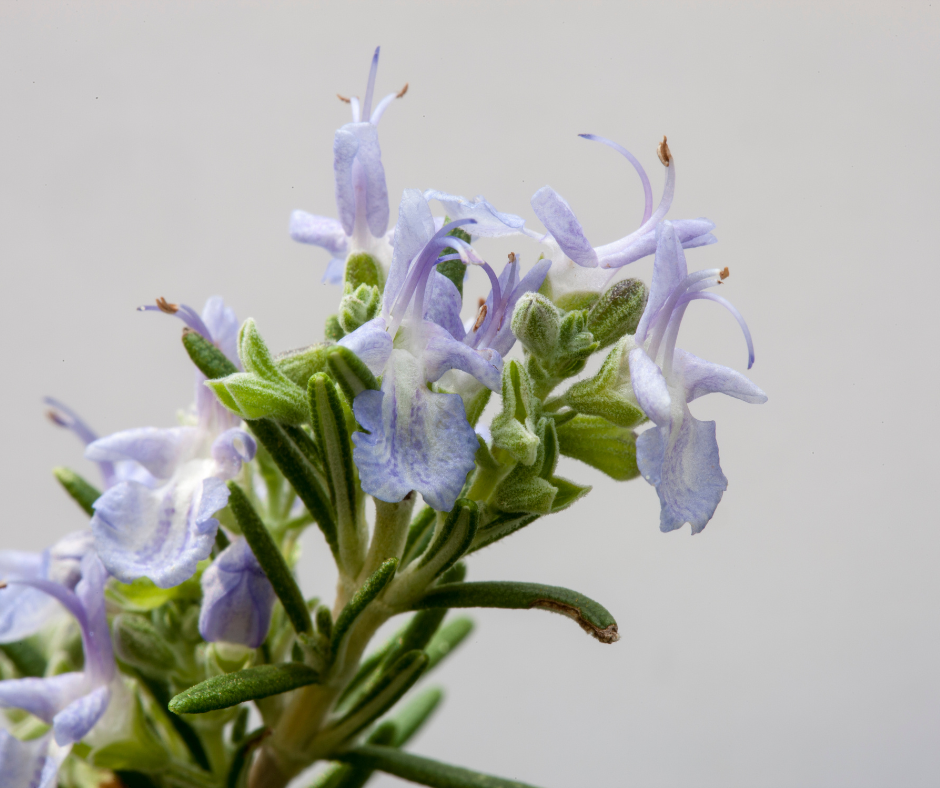

Unexpected Uses of Rosemary in the Kitchen and Beyond
Summary
Reflection Questions
Journal Prompt
Rosemary, a perennial herb with fragrant, needle-like leaves, is celebrated not only for its culinary versatility but also for its myriad uses beyond the kitchen. Traditionally valued for its aromatic contributions to dishes, rosemary’s utility extends into home decor, natural health and beauty remedies, eco-friendly cleaning solutions, and even garden management. This herb’s rich history and proven benefits have made it a staple in households seeking a more natural, sustainable lifestyle. By exploring the unexpected uses of rosemary, we uncover the depth of its potential to enhance our daily lives, from enriching our meals to offering natural alternatives for health and household care.
Surprising Culinary Uses for Fresh Rosemary Springs and Rosemary Extracts
Enhancing Beverages


Rosemary’s distinctive, aromatic flavor makes it an excellent addition to a variety of beverages, offering a refreshing twist that can transform the ordinary into something extraordinary. When infused into cocktails, rosemary introduces a woodsy, earthy note that complements both clear and dark spirits, elevating the complexity of the drink.
Use either a fresh rosemary sprig (the blue flowers and green rosemary leaves upgrade any presentation) or a rosemary simple syrup when creating your rosemary cocktail. We love a delicious bourbon lemon rosemary cocktail in a cheeky double old fashioned glass. That squeeze of lemon juice combined with the fresh rosemary leaf is absolutely delicious! However, it’s easy to transform a cocktail into a mocktail if you have a cocktail shaker and a few substitute ingredients at home.
For another non-alcoholic option, rosemary can be steeped in hot water to make a soothing rosemary tea that not only delights the senses but also offers digestive benefits. Moreover, adding a sprig of rosemary to infused waters (think lemon slices and cucumbers) imparts a subtle, invigorating flavor, perfect for hot summer days. This herb’s versatility in beverages showcases its ability to bridge the gap between traditional culinary uses and modern gastronomic creativity.
Sweet Treats and Desserts


Incorporating rosemary into sweet treats and desserts invites an intriguingly savory twist to the final course. The herb’s pine-like aroma pairs unexpectedly well with the sweetness of desserts, creating a sophisticated flavor profile. When baked into goods such as cookies, cakes, and bread, rosemary lends a delicate, herbal undertone that cuts through the richness.
Infusing it into ice creams or custards introduces a refreshing note, offering a gourmet experience that challenges conventional dessert norms. Additionally, rosemary syrups can be drizzled over fruits or used in sorbets, providing a nuanced flavor that complements the natural sweetness of the ingredients. This unexpected use of rosemary in desserts not only enhances the taste but also sparks curiosity and conversation around the dinner table.
Homemade Condiments


Rosemary’s robust flavor profile makes it an excellent candidate for elevating homemade condiments. By infusing it into oils, vinegars, and mustards, this herb imparts a depth of flavor that transforms simple dishes into memorable meals. Rosemary-infused olive oil can be used for dressing salads, drizzling over grilled vegetables, or as a dipping oil for artisan breads, adding a Mediterranean flair to any meal.
Join us for the focus & Flex challenge
Similarly, vinegar infused with rosemary brings a vibrant acidity to marinades and dressings, balancing the flavors with its herbaceous notes. When added to mustards, rosemary introduces a rustic edge that pairs wonderfully with meats and cheeses. These homemade condiments, enhanced with the essence of rosemary, not only elevate everyday cooking but also make thoughtful, personalized gifts for food enthusiasts.
Rosemary in Home and Decor
Natural Air Freshener and Deodorizer


Utilizing rosemary oil as a natural air freshener and deodorizer offers an eco-friendly and aromatic solution to keeping your living spaces smelling fresh. By simmering rosemary sprigs in water on the stove, you can create a homemade fragrance that not only purifies the air but also imbues your home with a refreshing, clean scent. This method leverages the essential oils within rosemary, which are released into the air during simmering, acting as a natural deodorizer.
Additionally, incorporating dried rosemary into homemade potpourri mixes can provide a long-lasting fragrance that’s both subtle and natural. Placing these potpourri mixes in various rooms or in small sachets in drawers and closets can help maintain a pleasant aroma throughout your home, making rosemary an effective and versatile choice for natural home fragrance solutions.
Creative Floral Arrangements and Wreaths


Rosemary’s aesthetic appeal and durability make it a fantastic choice for creative floral arrangements and wreaths, adding both beauty and a pleasant aroma to any space. Its stiff stems and lush, green foliage provide an excellent base for wreaths, offering a natural, rustic charm that complements a variety of decor styles. When used in bouquets or floral arrangements, rosemary can add texture and a layer of fragrance that enhances the overall presentation.
Its ability to blend well with other flowers and greenery allows for versatile design options, from minimalist arrangements to more complex, ornate compositions. Furthermore, rosemary’s symbolism of remembrance and loyalty adds a thoughtful touch to gifts or commemorative decor, making it a meaningful as well as a visually appealing choice. Incorporating rosemary into home decor not only enriches the aesthetic but also brings a piece of the garden indoors, creating a serene and inviting atmosphere.
Health and Beauty Applications for Rosemary Extract
Skin Care Solutions


Rosemary, revered for its anti-inflammatory and antiseptic properties, has found its niche in natural skin care solutions and herbal medicines. Infusing rosemary into skincare products such as toners, moisturizers, and facial oils can help soothe irritation, reduce redness, and combat acne by purifying the skin and keeping bacterial infections at bay.
Its antioxidants also protect skin cells from damage caused by the sun and free radicals, slowing the signs of aging. For individuals seeking a more natural approach to skincare, rosemary-infused products offer a gentle yet effective alternative, harnessing the herb’s healing properties to maintain healthy, glowing skin. This application of rosemary not only capitalizes on its aromatic appeal but also on its potent botanical benefits, making it a prized ingredient in the formulation of holistic skincare routines.
Hair Care Magic


The magic of rosemary extends into the realm of hair care, where its use in hair rinses can rejuvenate the scalp and encourage healthy hair growth. Rich in nutrients and anti-inflammatory compounds, rosemary stimulates blood circulation to the scalp, nourishing the hair follicles and promoting stronger, thicker hair.
Additionally, its antiseptic properties help to alleviate dandruff and prevent scalp issues, keeping the hair roots clean and healthy. A rinse made from steeped rosemary leaves or its essential oil diluted in water can be a simple yet powerful addition to one’s hair care regimen, offering a natural, chemical-free method to achieving lustrous, vibrant hair. This use not only highlights rosemary’s versatility but also its efficacy in enhancing hair health with every rinse.
Natural Remedies
Brewing rosemary tea is a traditional remedy with a plethora of health benefits, notably for digestive health and cognitive function. Consuming rosemary tea can aid in digestion, easing bloating, cramps, and constipation by stimulating the digestive system.
The cognitive benefits of these medicinal plants are equally impressive; research suggests that rosemary can enhance memory, concentration, and overall brain health, thanks to its antioxidant properties and its ability to increase blood flow to the brain. Whether used as a digestive aid after meals or as a cognitive enhancer during periods of work or study, rosemary tea stands out as a simple yet effective natural remedy. This therapeutic application underscores the herb’s longstanding value in herbal medicine, offering a holistic approach to maintaining health and wellness.
Rosemary in Household Management
Eco-Friendly Cleaning Products
In an era where eco-friendly and sustainable practices are more important than ever, rosemary emerges as a powerful ingredient in homemade cleaning products. Its natural antibacterial properties make it an excellent choice for disinfecting surfaces without the use of harsh chemicals.
By infusing rosemary in vinegar or water, one can create effective cleaning solutions that not only sanitize kitchen counters, bathrooms, and floors but also leave behind a pleasant, fresh aroma. This approach not only minimizes the environmental impact associated with conventional cleaners but also ensures a healthier living space, free from toxic residues. Rosemary’s versatility and efficacy in natural cleaning formulas showcase its potential beyond culinary uses, promoting a greener, cleaner home environment.
Pest Repellent


Rosemary’s potent aroma, while delightful to humans, acts as a natural deterrent against a variety of insects and pests. Its essential oils can be used to craft homemade repellents that are safe for use around the home and in the garden. By combining rosemary oil with water or other natural ingredients, one can create sprays that keep mosquitoes, flies, and even certain types of moths at bay.
This natural repellent is especially useful for those looking to avoid the harmful side effects of synthetic pesticides, offering a gentle yet effective solution to pest problems. Additionally, rosemary’s repellent qualities are beneficial in warding off vegetable and herb garden pests, protecting plants without the need for chemical interventions.
Rosemary in the Garden
Rosemary is not only a hardy, aromatic herb that thrives in many gardens but also serves as an excellent companion plant. Its strong scent repels many garden pests, such as carrot flies and cabbage moths, naturally protecting neighboring plants.
Moreover, rosemary attracts beneficial pollinators like bees and butterflies, enhancing the pollination of vegetable crops and flowers alike. This dual role of pest deterrent and pollinator attractant makes rosemary a valuable addition to any garden, contributing to healthier, more vibrant plant ecosystems.
However, it’s important to note that while rosemary offers many benefits for garden and household use, it should be used with caution around pets, as some cannot tolerate its essential oils. Responsible use of rosemary, considering both its advantages and potential risks, can lead to a flourishing garden and a more sustainable home environment.
Final Thoughts on Incorporating Rosemary (Rosmarinus officinalis) in Interesting Ways


From its role in elevating dishes and drinks with its distinctive flavor to its health benefits as a natural remedy and its efficacy in household and garden management, rosemary emerges as a symbol of natural living and sustainability. Its presence in our homes and gardens encourages a deeper connection with the natural world, reminding us of the simple yet profound impact that plants can have on our well-being, environment, and even our creativity. Embracing the full spectrum of rosemary’s uses not only enriches our experience but also inspires a more holistic approach to our lifestyle choices, celebrating the harmonious balance between nature and our daily lives.










